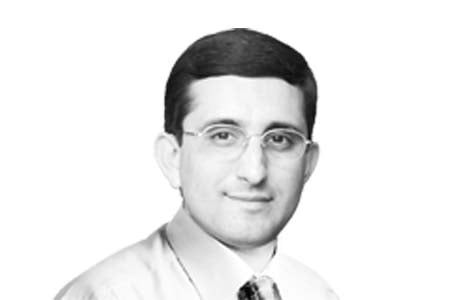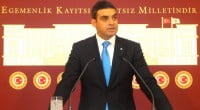Mr. Minister, please look at yourself in the mirror

Date posted: May 6, 2014
ALİ H. ASLAN
Insults about me, my paper and even the social community I am affiliated with were abundant. I am not the first journalist who has been subjected to a public defamation campaign in a country where the press is no longer characterized as free by the international community. Rest assured, I will not be the last. It might not have been worthwhile to offer a response if the problem were limited to some of the ridiculous assertions of the pro-government media. However, the recent unfortunate statements from Deputy Prime Minister Beşir Atalay warrant my shedding some more light on the incident.
In a TV show aired on Sunday by Kanal 24, Atalay said: “A representative of the Zaman daily asked a question. The moderator warned him. He did not ask a question; he made some critical remarks about Turkey. The moderator urged him to ask his question. And when his remarks were being answered, he shouted, ‘That wasn’t our question.’ It is such a schizophrenic structure and a great hate.”
Such distorting and offensive remarks by a member of the Cabinet reveal once again that those who blame others for the deterioration of Turkey’s image in the world had better look in the mirror to identify the culprit.
The true account of what happened in Washington last Tuesday is as follows:
I raised the first of my two questions in the first panel of the conference, where the presenters were mostly pro-government and pro-Recep Tayyip Erdoğan figures. The minister and Justice and Development Party (AK Party) fans, who constituted the majority in the conference hall, might not have liked it, because critical questions based on concrete facts undermine the party’s image and spoil the illusion of progress in Turkey and abroad.
First question: Does AK Party want to distress and intimidate its opponents?
Here is the full text of the question I raised in the first panel: “There was some mention of civility in the political campaign, but I heard much criticism of the opposition and nothing about Prime Minister Erdoğan’s civility. Actually, even after the election, in his victory speech, he said, ‘We are going to enter their dens,’ things like that, criticizing people who did not vote for them. And there were lots of comments regarding the Gülen movement, which pro-government people call the ‘parallel state.’ Although Minister Atalay says there is normalization in Turkey, when you look at what’s going on in Turkey and when you look at what the AK Party understands from these elections, we see a different trend going on. There has been hate speech, abundant hate speech, after the elections and before the elections. And this is not only about speech, but also about words put into action as well. And this is not only, by the way, in terms of the alleged formation in the bureaucracy, it is also about actions against civil society organizations, banks, newspapers, independent journalists, everyone. So what is going on in Turkey looks like a witch-hunt, which doesn’t look normal. Here is one comment from a high-level AK Party member of the Central Administration Board. His name is Mazhar Bağlı. And he said, after the elections: ‘The nation wants revenge. They want the people who make us vomit blood to vomit blood.’ So the question is this: Is this the AK Party’s future and vision for Turkey? Do they want the dissidents or opposition to vomit blood?”
I admit I might have made the prelude a little bit long. But this was not a press conference. And the person to whom I addressed my question was not a politician or an official. It is not unusual to make a contribution to discussions at an academic gathering with a question backed by some facts and comments. And it is also reasonable to offer some brief comments on the presentations. Besides, I wrapped up my question right after the polite interruption from the chair and directed it to SETA expert Hatem Ete. Ete talked for about four minutes, but he did not answer my question. He only reiterated his highly critical views of the Hizmet movement. The chair did not press Ete to respond to the question. For this reason, I took the initiative by saying, “The question was about the AK Party, not the Gülen movement, sir.” The chair said we could continue discussing this matter over lunch and that this segment of the conference was over.
It is true that I raised my voice a little during the follow-up question because I was far away from the panelists and did not have a microphone. And I will not deny that I was negatively affected by having no answer to my question and the demonization of a social group that I am affiliated with. Some of the pro-government press have described my attitude as “rude.” I never meant to be rude, and I apologize if I offended anyone. Would those who call someone who was just trying to do his job names such as “schizophrenic” like to apologize as well?
Second question: The value of Turkish-American relations to Turkish democracy
In the second panel, I was subjected to further mistreatment by the mentality that has become increasingly intolerant of diverse opinions in recent years. This time, Mustafa Karaalioğlu from the pro-government Star daily refused to tackle my question, arguing that it was not “journalistic.” Here is the question, and I’ll let others be the judge.
“Actually, my question is about the Turkish media. I have heard some of the comments regarding media freedoms. Just a note, as a journalist myself: When we talk about media freedoms, it’s not only about jailed journalists, it’s also about censorship, self-censorship, pressure on media owners, tax issues, tax pressures, things like that. Mr. Karaalioğlu mentioned that there are 10 newspapers in Turkey that are bashing Prime Minister Erdoğan. I can also count about eight to 10 newspapers that are continually bashing anti-Erdoğan groups in Turkey, including the Gülen movement. This bashing is not limited to the opposition, as it is also about the US. My particular question is about US coverage in the pro-government media. I remember your newspaper, Mr. Karaalioğlu, coming up with a news story alleging that US Ambassador Francis Ricciardone said at a meeting, ‘You will now see the fall of an empire,’ after the Dec. 17 corruption case issue. And I remember Mr. [Ali] Bayramoğlu’s newspaper [Yeni Şafak] coming up with a front-page headline saying ‘Get out of this country’ that mentioned Ambassador Ricciardone. And in a rally Erdoğan actually said, ‘We don’t have to keep them in our country.’ In general, the pro-government media and government are actually criticizing the US very forcefully, with conspiracy theories and everything. The question is, why are the Erdoğan government and government-friendly press so suspicious of the US role in Turkish democracy? Do you see the US-Turkey strategic relationship as an asset or liability for Turkey’s democratization process?”
Just like his colleague from SETA, Karaalioğlu did not bother to address my question; instead, he preferred to bash the Hizmet movement for three minutes. Ambassador Jim Holmes had to intervene, saying: “Excuse me Mustafa Bey. The question was, what is the value of the US-Turkish relationship in the evolution of Turkish democracy?” I am sure, with the exception of partisans, nobody in the room thought the question was illegitimate or inappropriate. Karaalioğlu insisted on avoiding the question. And he said he did not recognize the “right” of a question from those overlooking the “illegal materials” produced by the so-called “parallel state.” This attitude, which was obviously at odds with the spirit of press freedom, brought applause from the AK Party fans at the conference. However, it shocked impartial participants, particularly the Americans. Holmes went on seeking an answer from other panelists, because he deemed the question to be important. In the end, Oral Çalışlar from Radikal shared his views in a fairly colorful style.
What they want is propaganda, not journalism
In Turkey we are faced with a mindset that expects journalists to self-censor and makes sure those who refuse are censored, discredited or fired from their jobs, all for the sake of preserving or repairing the government’s image. More sadly, militant pro-government journalists insult their colleagues and turn them into a target for the state apparatus and the public. The ruling AK Party considers itself the only representative, if not the landlord, of the country. In an effort to blame others for their mistakes, which have resulted in a deterioration of Turkey’s image in the international arena, individuals or groups criticizing the party’s actions are often declared to be working against Turkey. Independent journalists, intellectuals, businessmen and other civilian and political actors are used as scapegoats. Some of them, such as the Hizmet movement, are even labeled traitors as a tactic of psychological warfare.
Minister Atalay asserted that we at Zaman covered the SETA conference poorly by making “false interpretations.” I would be happy if he could say what in particular was erroneous or misleading in our pieces. It is preposterous to point at us for undermining the image of the government, as if it has been perfect in the world. Over the last 17 years as the Zaman newspaper’s correspondent in Washington, no one has questioned my integrity and competence. I do my analyses based on substantial research and credible sources. Even though Mr. Atalay and his government are not pleased with independent journalists and try to silence them via smears, slander and repression, we will keep asking critical questions because this is the utmost responsibility and duty of the press in democratic countries.
Source: Todays Zaman , May 6, 2014
Tags: Freedoms | Hizmet and politics |
























